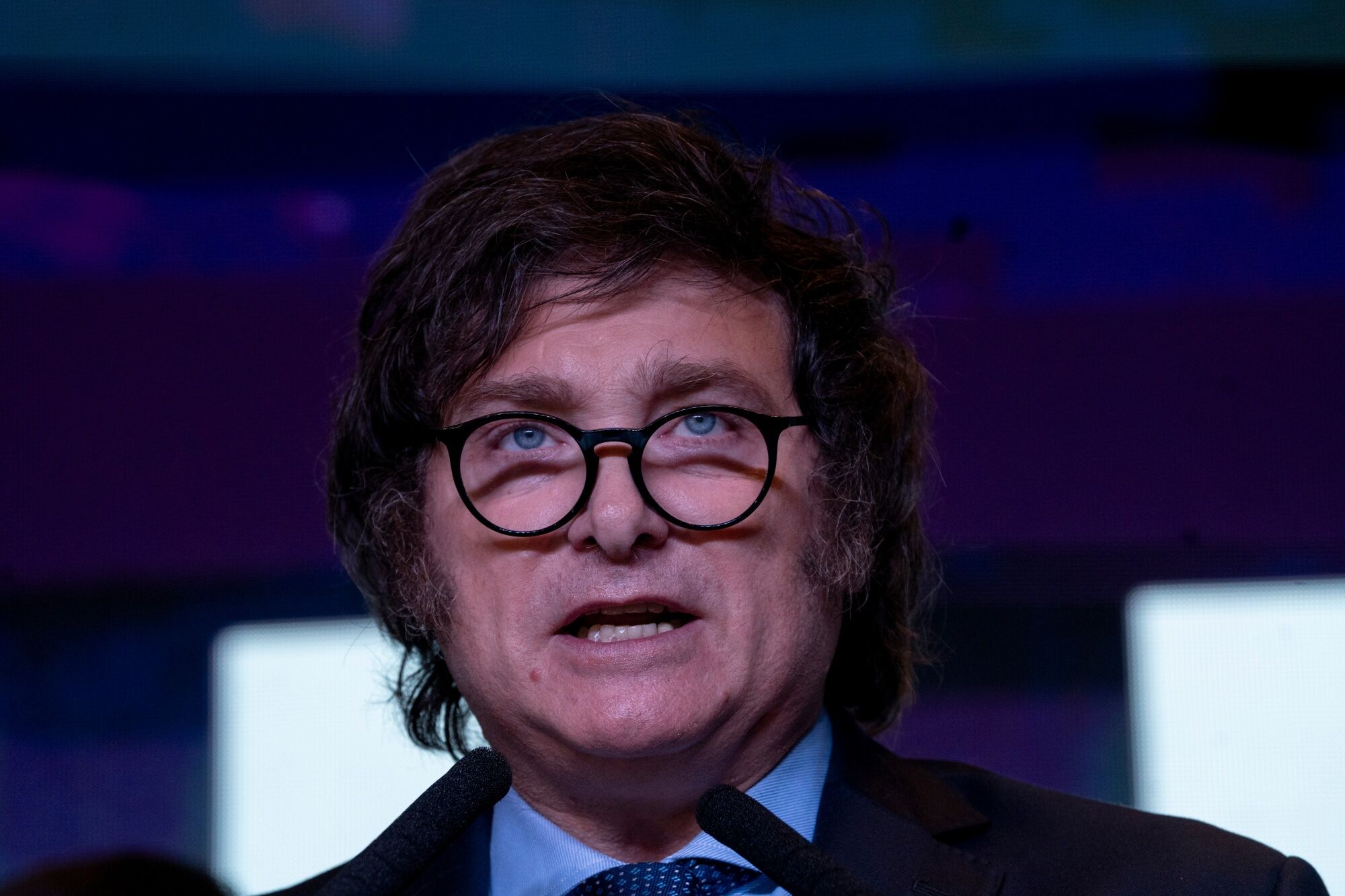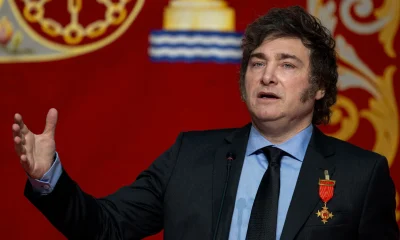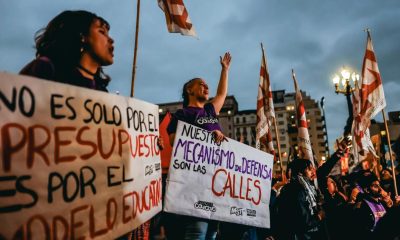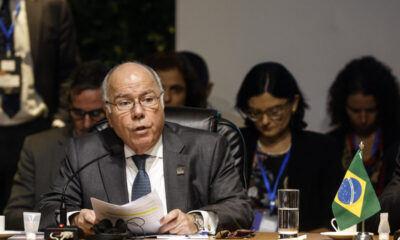International
Milei presents package of laws to Congress on day of demonstrations against him

December 28 |
The President of Argentina, the ultra-liberal Javier Milei, presented this Wednesday to Congress a package of laws, texts which contemplate the deregulation of the economy after the decree approved by the President last week, measures which provoked demonstrations against him and which so far resulted in six arrests.
Convened by the main labor centers, thousands of people gathered in front of the Palace of Tribunals in Buenos Aires to demand that the decree published last week to reform or repeal more than 300 regulations be declared unconstitutional.
“We do not question the legitimacy of President Milei, but we want him to respect the division of powers. Workers have the need to defend their rights when there is an unconstitutionality,” Gerardo Martínez, secretary general of the construction union, one of those who led the demonstration which was also joined by social organizations, told the press.
This initiative will come into force on Friday, within the framework of a strong fiscal adjustment that has already implied a devaluation of the peso of more than 50%.
“We have come to say no to the decree because it takes away one of the powers of the State, the Congress”, said to AFP Adrian Grana, one of the demonstrators for whom the presidential initiative “is a decalogue to favor the powerful to the detriment of the people”.
The demonstration developed peacefully until after midday, when a group of people had small altercations with police officers who were trying to prevent them from closing a street.
Six demonstrators were arrested, according to the press.
The Minister of the Interior, Guillermo Francos, delivered to parliament a draft “omnibus law”, which includes a reform of the electoral system and the tax system, in addition to allowing the privatization of public companies, among other measures.
“We promote these reforms in the name of the May Revolution of 1810 and in defense of the life, liberty and property of Argentines,” Milei wrote in his X account when announcing the legislative project that completes his decree.
Congress opened extraordinary sessions on Tuesday to deal with these laws.
Milei, who took office on December 10 with the promise to reduce State spending, has already announced that he will not renew the contracts of 7,000 public employees.
The President hopes that the adjustment of public spending will reach the equivalent of 5% of the Gross Domestic Product (GDP).
The decree limits the right to strike, modifies labor agreements and the system of severance pay, also repeals laws protecting consumers against abusive price increases when annual inflation exceeds 160% and 40% of the population live in poverty.
“Today we are going to court, but there is another chapter focused on the Congress that will have to give a deep debate” on the content of the decree, said Gerardo Martinez.
The union leader urged the government to “form a collective tripartite dialogue table with employers and unions, as other countries that have gone through a severe adjustment have had”.
The Congress, where the ruling party is the third minority, can invalidate the decree, but this would take several months.
The initiative repeals the retirement mobility law and the law regulating rents, frees the price of bank commissions and punitive rates for debts and allows sports clubs to become corporations.
“It is destructive of all labor rights. The Argentine people elected Milei as president of the Nation, not as emperor,” criticized Martín Lucero, a 45-year-old teacher who came from Rosario to support the march.
Last week the courts opened a file to analyze a collective appeal against the decree.
“All the measures go right through me, they are going to starve us,” said Sofía Julián, a 33-year-old employee who came to the march from the southern outskirts of Buenos Aires. “We are united and organized and we are going to continue fighting to oppose the decisions taken by this government against the Argentine people,” she added.
International
Football Fan Killed in Clashes After Colombian League Match

Fans of Cúcuta Deportivo and their traditional rivals Atlético Bucaramanga clashed outside the stadium following their local league match on Tuesday, leaving one supporter dead and several others injured.
The deceased fan was stabbed, according to a senior police official in Cúcuta who confirmed the cause of death in a video statement. Local media reported that the victim was a supporter of the visiting team, Atlético Bucaramanga.
The match ended in a 2-2 draw. Authorities had banned the entry of Atlético Bucaramanga’s organized supporters into the stadium in an effort to prevent disturbances.
Despite the restrictions, violence broke out in the surrounding areas after the game. Among the injured were three police officers, an institutional source told AFP.
The incident adds to a series of recent violent episodes linked to Colombian football. The most recent occurred in December, when supporters of Atlético Nacional and Independiente Medellín clashed in the stands and on the pitch, leaving 59 people injured.
International
Missing Spanish Sailor Rescued After 11 Days Adrift in Mediterranean

The man had departed from the port of Gandía, on Spain’s eastern coast, with the intention of reaching the southern Spanish town of Guardamar del Segura, a journey of about 150 kilometers, a spokesperson for Spain’s maritime rescue service told AFP.
Search boats and aircraft were deployed on January 17, but the operation was called off on January 22 after efforts proved unsuccessful. Alerts were then issued to vessels navigating the area in case they spotted any signs of the missing sailor.
As hopes were fading, a surveillance aircraft from the European Union’s border agency Frontex spotted the sailboat on Tuesday, along with a person signaling for help, approximately 53 nautical miles northeast of Bejaia, Algeria.
A nearby vessel, the Singapore-flagged bulk carrier Thor Confidence, carried out the rescue and is expected to bring the man to an end to his ordeal when it arrives on Thursday in the southern Spanish port city of Algeciras.
Maritime rescue services shared images on social media showing a small white sailboat drifting at sea and secured alongside the much larger ship.
It remains unclear how the sailboat ended up hundreds of kilometers off its intended route or how the man managed to survive for so long alone in open waters.
International
Rubio Says U.S. Could Participate in Follow-Up Russia-Ukraine Talks

The United States could join a new round of talks this week aimed at ending Russia’s invasion of Ukraine, Secretary of State Marco Rubio said on Tuesday.
Teams from Kyiv and Moscow met last Friday and Saturday in Abu Dhabi in their first publicly acknowledged direct negotiations to discuss the peace initiative promoted by former U.S. President Donald Trump.
“They are going to hold follow-up talks again this week,” Rubio told the Senate Foreign Relations Committee. “There could be U.S. participation.”
However, Rubio suggested that Washington’s role may be more limited than during last week’s discussions, which included Steve Witkoff, the president’s special envoy, and Jared Kushner, Trump’s son-in-law.
The secretary of state indicated that progress may have already been made on security guarantees for Ukraine, one of Kyiv’s key demands in any agreement with Moscow after nearly four years of Russian invasion.
“There is one remaining issue that everyone is familiar with, and that is the territorial claim over Donetsk,” Rubio said, referring to the eastern Ukrainian region that Russia wants Ukraine to cede.
“I know that active efforts are underway to see whether the positions of both sides on this issue can be reconciled. It remains a bridge we have not yet crossed,” he added during the hearing.
Rubio acknowledged that the territorial question would be particularly difficult for Ukraine to resolve.
-

 Central America3 days ago
Central America3 days agoGuatemala seizes over a ton of cocaine hidden in flour at Pacific port
-

 International5 days ago
International5 days agoTrump-Era Defense Plan Prioritizes Border Security and Scales Back Global Commitments
-

 International5 days ago
International5 days agoBogotá and Quito Seek Dialogue After Tariffs and Power Cut Escalate Tensions
-

 International4 days ago
International4 days agoDelcy Rodríguez seeks political agreements after Maduro’s ouster
-

 International3 days ago
International3 days agoHistoric snowstorm paralyzes Toronto after 60 centimeters of snow
-

 International3 days ago
International3 days agoSpain’s irregular migrant population rises to 840,000, study finds
-

 International4 days ago
International4 days agoFederal immigration agents kill man in Minneapolis, sparking protests and outrage
-

 Central America2 days ago
Central America2 days agoGuatemala Police Arrest Prison Guard Caught in the Act of Extortion
-

 Central America2 days ago
Central America2 days agoHonduras swears in conservative president Asfura after disputed election
-

 Central America2 days ago
Central America2 days agoBukele leads public trust rankings as UCA survey highlights gains in security
-

 Sin categoría2 days ago
Sin categoría2 days agoEight Killed in Series of Armed Attacks in Ecuador’s Manabí Province
-

 International3 days ago
International3 days agoRights group says nearly 6,000 killed in Iran protest crackdown
-

 International2 days ago
International2 days agoDoomsday clock moves to 85 seconds before midnight amid rising global risks
-

 International2 days ago
International2 days agoWinter Storm Fern Leaves 30 Dead and Over One Million Without Power Across the U.S.
-

 International9 hours ago
International9 hours agoFootball Fan Killed in Clashes After Colombian League Match
-

 International3 days ago
International3 days agoVenezuela frees at least 80 political prisoners, NGO says
-

 International2 days ago
International2 days agoSpain approves plan to regularize up to 500,000 migrants in Historic Shift
-

 Sin categoría2 days ago
Sin categoría2 days agoEl Salvador Launches Fourth Year of Ocean Mission to Protect Marine Ecosystems
-

 International10 hours ago
International10 hours agoRubio Says U.S. Could Participate in Follow-Up Russia-Ukraine Talks
-

 International3 days ago
International3 days agoEU launches new probe into X over AI-generated fake nude images
-

 International10 hours ago
International10 hours agoMissing Spanish Sailor Rescued After 11 Days Adrift in Mediterranean
-

 Central America9 hours ago
Central America9 hours agoGuatemala President Says Starlink Terminal Found Inside Prison
-

 International3 days ago
International3 days agoSevere winter storm grips U.S., leaves multiple dead as extreme cold persists
-

 International3 days ago
International3 days agoFrance debates ban on social media for children under 15


































































